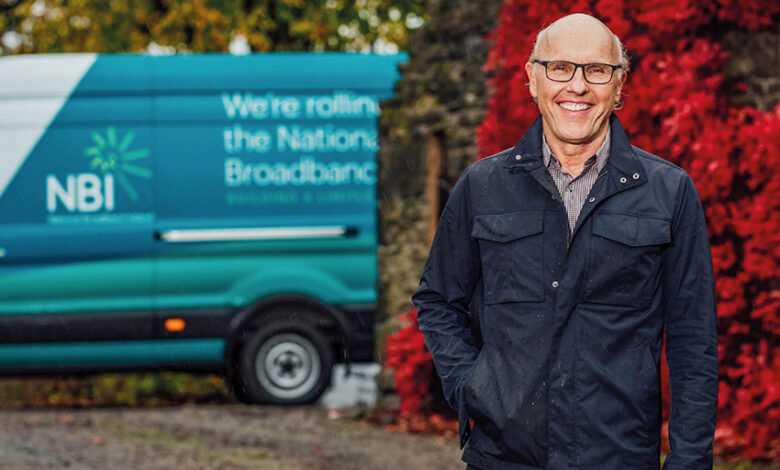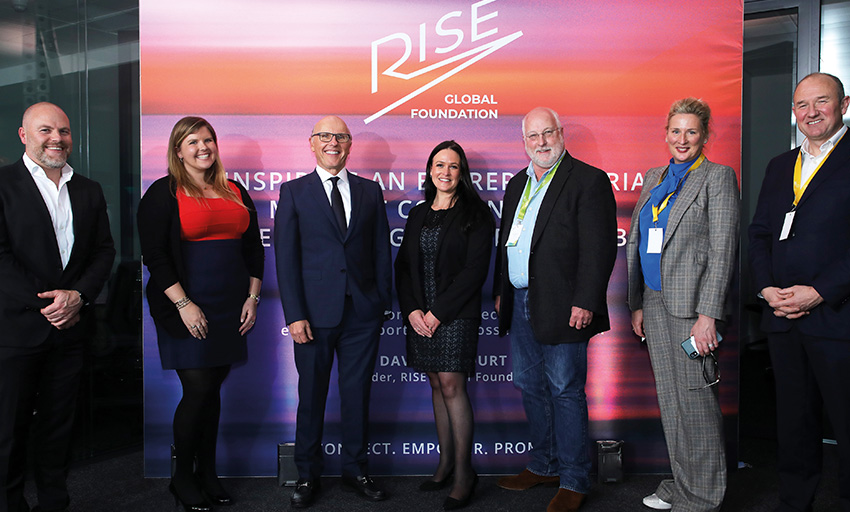A global leader

As of 2022, high-speed broadband connections under the Government’s National Broadband Plan (NBP) have been established in every county in the State. David McCourt, Chairman of National Broadband Ireland (NBI), the company tasked with spearheading the project, discusses the opportunities of modern and futureproofed broadband infrastructure for Ireland.
Dwarfing all national infrastructure projects undertaken since rural electrification, the National Broadband Plan is a government initiative to make available high-speed broadband infrastructure for all premises in the State, ensuring that “every citizen and business, no matter where they are based, can progress together”.
Indeed, with an intervention area spanning 96 per cent of the State’s landmass and encompassing over 560,000 premises and 1.1 million homes, the network is projected to require a total of 140,000km of fibre cable, more than 1.5 million poles, and over 15,000km of underground duct networks.
Replacing traditional copper telecoms networks, optical fibre cables – coated silica glass strands – have the capacity to carry significant data over vast distances and will futureproof the broadband network. Wherever possible, the rollout will utilise existing infrastructure to avoid duplication.
For David McCourt, the priority today is the same as the day when Granahan McCourt won the NBP contract. “We have an ambitious build schedule to meet, and we are motivated to do everything in our power to deliver the rollout on time and on budget. Most importantly, we are working with the Government and other partners to make sure that the National Broadband Plan does not just bring enhanced streaming speeds to rural Ireland, rather that it creates jobs and reduces unemployment,” he says.
Having secured the €3 billion contract to build, operate, and maintain the new national high-speed broadband network in November 2019, Granahan McCourt incorporated a new Irish registered company – National Broadband Ireland – to deliver the objectives of the NBP.
“Through the implementation of the NBP, Ireland has become one of a very small and prestigious number of countries to make the availability of high-speed broadband a human right.”
David McCourt, Chairman of National Broadband Ireland (NBI)

Ultimately, the NBP aims to connect 65,000 farms, 44,000 small businesses, 679 schools, and 1.1 million people across every county in the State. Despite delays aggravated by the Covid pandemic and associated public health restrictions, McCourt is confident about the momentum that’s now being achieved in the rollout.
“For context, 45 days after we signed the contract for the National Broadband Plan, Covid hit and completely disrupted our access to materials and skills. That was a real problem early on,” the NBI Chair explains, before adding: “However, we have overcome those challenges and have consistently narrowed the subsequent delay to delivery.”
Ahead of schedule for the Covid-adjusted annual target for the contract year ending 31 January 2023, as set by the Department of the Environment, Climate and Communications, NBI’s rollout delivered over 102,000 premises passed and more than 232,000 premises under construction.
Meanwhile, 760 high-speed broadband connection points (BCPs) are now available, providing free public access at community facilities in every county. These BCPs pave the way for homes, farms and businesses to get their premises connected with minimum speeds of 500Mbps.
“My vision for the National Broadband Plan has been the same from day one; it is about bringing employment and dignity, while enabling a more cohesive community spirit to rural Ireland.”
Transformative policy
A son of Galway emigrants and a native of Boston, Massachusetts, McCourt keenly reflects on “several visionary and bold policy decisions which have served to transform Ireland”. Among these, he includes the Rural Electrification Scheme beginning in 1946, the advent of free post-primary education in the 1960s, the expansion of the motorway network from the early 1990s onwards, and the recent referenda campaigns.
Firmly categorising the NBP as an initiative with the capacity to have a similarly transformative effect, the NBI Chair emphasises: “Through the implementation of the NBP, Ireland has become one of a very small and prestigious number of countries to make the availability of high-speed broadband a human right.”
While acknowledging that such policies invariably encounter short-term challenges and even controversy, he asserts: “Ultimately, long-term policies – such as the NBP – have allowed Ireland to evolve from a relatively small agrarian country to a global leader.”
Progress in 2022
As of the end of 2022, more than 30,000 homes, farms, businesses, and community facilities have been connected to – or have requested connection to – the NBI high-speed fibre network, guaranteeing them access to minimum broadband speeds of 500Mbps.
Reflecting on this progress, McCourt highlights that a further 120,000 premises can order or pre-order connection, while two-thirds of the entire intervention area – around 375,000 premises – have been surveyed, and of these 350,000 have been through detailed designs. Similarly, over 860 BCPs – community facilities through which the public can access free high-speed broadband – and schools have been connected.
“NBI has 60 retail providers signed up on its open access wholesale platform, more than on any single platform in Europe. For instance, there are other companies on the market that have been in the wholesale business for 40 years and do not have a fraction of that figure,” he adds.
As such, retail providers are introducing most new customers to high-speed broadband for the first time while also migrating existing customers with inferior connectivity to the new fibre network.
Overall, rollout of the NBP exceeded NBI’s ambition for the 2022 contract year. While only 30 per cent of premises in the State had access to high-speed broadband in 2021, rollout of the NBP has helped to increase this figure to 77 per cent ahead of a projected 95 per cent by 2025.
“We went into 2022 with a ‘Covid hangover’,” McCourt observes, adding: “As such, while we successfully reduced the resulting delay, it will take another 18 months to get back on the overall schedule. Regardless, NBI is extremely confident in its projections for output in 2023.”
Regional development
While Ireland has been hugely successful in attracting multinational companies to headquarter their European operations in Dublin, McCourt insists: “Now it has to be equally successful in creating an entrepreneurial spirit and jobs in its rural communities.”
Globally, as per UN estimates, approximately three million people migrate into an urban environment each week. Every three weeks, therefore, the world’s towns and cities absorb a total population equivalent to that of New York or London.
Suggesting that this is unsustainable, McCourt indicates that the solution is to cultivate an entrepreneurial spirit, as well as deploy new technologies, in rural settings.
In the context of balanced regional development, he references a University of Southern California study which examined the impact of broadband deployment on poverty reduction in rural Ecuador. The study determined that broadband connectivity had “positive impacts on key determinants of rural poverty, including labor income and employment”, though it also states that “digital skills and attitudes toward new technologies moderate the potential benefits of ICT infrastructure”.
“The conclusion, therefore,” McCourt observes, “is that fibre installation does not deliver transformational change in isolation. It is necessary to have a concerted effort encompassing policymakers, businesses, community groups, and citizens to maximise the skills capacity to capitalise on new infrastructure.
“If we can install the fibre, cultivate an entrepreneurial spirit, and deliver a collaborative ethos, there will be an eruption of entrepreneurialism in rural Ireland. People will be empowered to establish and run a small business from their home, while retaining their presence in beautiful rural locations. This would help address many challenges, including the housing crisis, traffic congestion in towns and cities, greenhouse gas emissions, and depopulation of rural areas.”
Skills
Remarking on the capacity of Ireland to empower its citizens to capitalise on high-speed connectivity, McCourt refers to NBI’s collaboration with government, and Minister for Rural and Community Development, Heather Humphreys TD, as well as Minister of State with responsibility for Public Procurement, eGovernment and Circular Economy, Ossian Smyth TD, in particular.
“The NBP is the foundation and all of us together, as a nation, must work together to put the walls up and the roof on. Together we must upskill people and find ways to instil an entrepreneurial spirit,” he says.
While acknowledging that Ireland already has a relatively skilled workforce, the NBI Chair believes more is required. “That is one of the reasons why I established the RISE Global Foundation. RISE is a charity which aims to connect, empower, and promote people across rural communities, creating employment through a combination of entrepreneurial mindset and technology,” he explains.
Aligning with the route of the NBP rollout, RISE – with the support of Granahan McCourt and NBI – identifies and allocates grants to small businesses, charities, social enterprises, community groups, schools, and farms which are “willing to use technology and an entrepreneurial spirit to create jobs”.
Benefits of connectivity
Discussing the transformative potential of the NBP, McCourt is confident that the single most significant advantage of delivering national broadband infrastructure is employment.
“Jobs bring dignity,” he says, elaborating: “They also enhance social cohesion and increased employment means reduced antisocial behaviour, reduced crime, reduced divisiveness, and reduced violence.”
McCourt anticipates that Ireland Inc’s reputation will also benefit from enhanced and futureproofed telecommunications infrastructure in two specific ways.
“Firstly, for over 150 years, Ireland has exported its construction labour all over the world, building cities in Britain, North America, Australia, and beyond. More recently, Ireland has encouraged large international companies to establish themselves here. Now, however, it is time to create, grow, and export indigenous businesses with the same success that we have had helping other nations to literally build their cities. Ireland must create more jobs which germinate, grow, and succeed in this country.
“Secondly, outside of the US, Ireland is the only country in the world that has all the big tech companies housed in one location. At an international level, therefore, Ireland has an opportunity to play a leading role in spearheading new tech policies to shape the future. Ireland Inc should be known as a thought leader on what internet 3.0 should look like.”
Investment partner
In a deal which secured both McCourt’s chairmanship and the continued operational control of the existing NBI management, Asterion Industrial Partners – a long-term investment partner – received ministerial consent for its acquisition of an 80 per cent share in NBI in October 2022. Alongside shareholdings owned by NBI management, founding shareholders, Granahan McCourt retain the remaining 20 per cent share.
“Primarily, the objective of the partnership with Asterion was to secure NBI’s balance sheet in the long term so that it can focus on the delivery of the National Broadband Plan. NBI did not want to be in a situation whereby seeking capital proved to be a distraction.
“Asterion is a specialist investor in European telecoms infrastructure and a world class partner with a growing portfolio of rural fibre networks across Europe. It is a huge endorsement of the NBP that a long-term infrastructure investor such as Asterion wanted to come in here.”
Vision
Contemplating the overarching vision for the NBP, McCourt’s belief in the transformative impact of the project is evident. “I have witnessed the economic collapse of my own local village in west Clare. While the population has increased in the village, services have decreased. As such, my vision for the National Broadband Plan has been the same from day one; it is about bringing employment and dignity, while enabling a more cohesive community spirit to rural Ireland,” he reiterates.
Simultaneously, the NBI Chair firmly believes that Ireland can be at the forefront of the global trend towards wholesale open access networks (WOAN) for constructing ‘last mile’ broadband infrastructure.
“Ireland can demonstrate to the world that this controversial project was the right policy decision and indeed an archetype for national broadband infrastructure. We know better than anyone how to design and build a network, how to create and stimulate demand, how to maintain a network, and foresee challenges before customers do. Similar to the precedent set by ESB International, Ireland has the potential to export its high-speed broadband infrastructure services and products to the rest of Europe,” McCourt concludes.
|
David McCourt, Chairman of National Broadband Ireland and Chairman and CEO of Granahan McCourt Capital David McCourt is the Chairman of National Broadband Ireland and Chairman and CEO of Granahan McCourt Capital. Described by The Economist as possessing “impeccable credentials as a telecom revolutionary”, he has founded or bought over 20 tech, media, and telecoms companies in nine countries. He is also a best-selling author and Emmy award-winning TV producer. McCourt has held roles as CEO, President, and board member at some of the world’s biggest telecom network operators, including Level 3 Communications, MFS Communications, Corporate Communications Network, and MCI WorldCom, as well as Commonwealth Telephone Enterprises. Growing up “in a very south Boston Irish home” with seven children, two parents, and two grandparents all living under one roof, McCourt regards his childhood as being defined by a “very rural Irish mentality” transplanted into in an urban setting in the United States. While his parents were natives of Ballymacward – a small village between Athenry and Ballinasloe in east County Galway – he continues to spend as much time in his west County Clare home as possible. |





